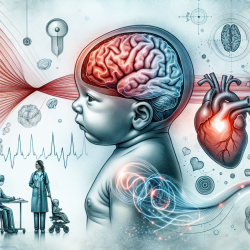Understanding the Impact of Systemic Inflammation on Brain Injury in Newborns with Congenital Heart Disease
Recent research has highlighted the potential implications of systemic inflammation on brain injury in newborns with congenital heart disease (CHD) undergoing heart surgery. The study, titled Brain injury with systemic inflammation in newborns with congenital heart disease undergoing heart surgery, provides valuable insights into the biomarkers and inflammatory responses that could affect neurodevelopmental outcomes in these vulnerable patients.
Key Findings and Their Implications
The study involved 23 newborns with CHD who required cardiac surgery with cardiopulmonary bypass (CPB). Serum levels of phosphorylated neurofilament-heavy subunit (pNF-H), neuron-specific enolase (NSE), and S100B were measured to assess brain injury. These biomarkers were found to be significantly elevated in patients compared to healthy controls, indicating potential blood-brain barrier (BBB) dysfunction and CNS injury.
Furthermore, the study found that systemic inflammation, measured through cytokines like IL-12p70, IL-6, IL-8, and TNF-α, was significantly higher in patients both pre- and post-surgery. The correlation between elevated cytokine levels and brain injury markers suggests that inflammation may exacerbate BBB dysfunction and contribute to neuronal damage.
Clinical Implications for Practitioners
For practitioners, these findings underscore the importance of monitoring inflammatory markers in newborns with CHD undergoing surgery. By identifying patients at risk of heightened inflammatory responses, clinicians can tailor interventions to mitigate potential CNS injury. Strategies may include:
- Implementing anti-inflammatory treatments pre- and post-surgery to reduce cytokine levels.
- Utilizing modified ultrafiltration techniques during CPB to remove inflammatory mediators.
- Monitoring brain biomarkers like pNF-H and S100B to assess BBB integrity and CNS health.
Moreover, the study suggests that understanding the individual inflammatory profiles of patients could lead to more personalized care plans, potentially improving neurodevelopmental outcomes.
Encouraging Further Research
While this study provides crucial insights, further research is needed to fully understand the mechanisms linking systemic inflammation and brain injury in newborns with CHD. Future studies could explore:
- The long-term neurodevelopmental outcomes associated with elevated inflammatory markers.
- The efficacy of specific anti-inflammatory interventions in reducing CNS injury.
- The role of genetic and environmental factors in modulating inflammatory responses.
By continuing to investigate these areas, researchers and clinicians can work towards developing more effective strategies to protect the developing brains of newborns with CHD.
To read the original research paper, please follow this link: Brain injury with systemic inflammation in newborns with congenital heart disease undergoing heart surgery.










